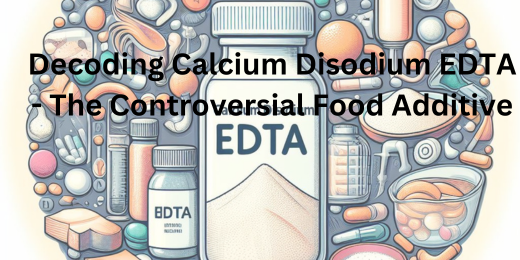Effects of Calcium Disodium EDTA
Calcium Disodium EDTA is a chemical compound used in various processed foods as a food additive. Its primary purpose is to enhance the shelf-life and quality of these products. Acting as a chelating agent, it binds to metal ions, preventing them from causing spoilage or discoloration.
This property is particularly valuable in preserving the texture and appearance of canned fruits and vegetables. However, concerns have been raised regarding the potential effects of Calcium Disodium EDTA on health. Some studies suggest that excessive consumption may lead to mineral imbalances in the body.
While it’s generally recognized as safe when used within established limits, moderation is key. Understanding the role of Calcium Disodium EDTA in food processing empowers consumers to make informed choices about their diet. It’s essential to weigh the benefits of extended shelf-life against potential health considerations, ensuring a balanced approach to food consumption.
The Chemistry Behind Calcium Disodium EDTA: How it Works
Understanding the chemistry of Calcium Disodium EDTA sheds light on its functionality as a food additive. This compound operates as a chelating agent, a term derived from the Greek word “chele,” meaning claw. Essentially, it forms a molecular structure resembling a claw, which binds tightly to metal ions present in food.
This process inhibits the metals from reacting with other compounds, thereby preserving the food’s quality. For instance, in canned goods, it prevents the oxidation of colours and the breakdown of texture that can occur over time. The unique structure of Calcium Disodium EDTA allows it to effectively capture and neutralise unwanted metal elements.
However, it’s imperative to recognise the delicate balance required, as excessive use can potentially lead to mineral imbalances in the human body. By comprehending the chemical principles at play, consumers can make informed decisions about the effects of Calcium Disodium EDTA in their dietary choices.
The Controversy Surrounding Calcium Disodium EDTA: Safety Concerns
The use of Calcium Disodium EDTA in food processing has stirred up debates and concerns regarding its safety. While it is generally recognised as safe within specified limits, some studies have raised questions about potential health implications. Similarly, the effects of xanthan gum, a widely used food thickener, are generally considered safe within recommended limits.
One primary concern lies in the possibility of mineral imbalances in the body due to the chelating properties of Calcium Disodium EDTA. By binding to metal ions, it can potentially affect the absorption of essential minerals like calcium and magnesium.
Critics argue that prolonged or excessive consumption could lead to nutritional deficiencies. However, it’s crucial to acknowledge that the compound is subject to strict regulatory oversight, with established limits on its usage in food products.
This ensures that it is employed judiciously and responsibly. The controversy surrounding Calcium Disodium EDTA underscores the importance of informed consumption, where individuals consider both the benefits and potential effects of Calcium Disodium EDTA on their overall health.
Regulatory Oversight: Limits and Guidelines for EDTA Usage
The usage of Calcium Disodium EDTA in food processing is subject to rigorous regulatory oversight. This compound, although valuable in preserving food quality, is carefully monitored to ensure its safe application. Regulatory bodies set specific limits and guidelines regarding its usage in various food products.
These limits are established based on extensive scientific research and evaluations, taking into account potential health concerns. This meticulous approach aims to strike a balance between the benefits of using Calcium Disodium EDTA in food preservation and the potential effects of Calcium Disodium EDTA on consumer health.
By adhering to these established limits, manufacturers and producers can confidently incorporate this additive into their products, providing consumers with safe and high-quality food items. This regulatory framework stands as a testament to the commitment of authorities to safeguard public health while maintaining the integrity and longevity of processed foods. Similarly, the effects of sodium benzoate on human health have been the subject of ongoing research and debate.
Applications of Calcium Disodium EDTA in the Food Industry
Calcium Disodium EDTA finds wide-ranging applications in the food industry owing to its remarkable chelating properties. One significant use is in preserving the texture and colour of canned fruits and vegetables. By binding to metal ions, it prevents oxidative reactions that can lead to undesirable changes in the appearance and texture of these products.
Additionally, Calcium Disodium EDTA is employed in stabilising the colour of certain processed foods, particularly those with vibrant hues like canned fruit cocktail. It also plays a crucial role in preventing the rancidity of fats and oils, extending the shelf-life of various packaged foods.
Moreover, in carbonated beverages, it acts as a sequestrant, enhancing the stability of flavouring agents. These diverse applications demonstrate the versatility of Calcium Disodium EDTA in maintaining the quality and visual appeal of processed foods, contributing to their overall marketability while addressing concerns related to the effects of Calcium Disodium EDTA.
Making Informed Choices: Consumer Perspectives on EDTA in Food
Informed consumer choices regarding the use of Calcium Disodium EDTA in food products are crucial for a balanced diet. While this food additive has proven benefits in preserving food quality and safety, it’s essential for consumers to be aware of the potential effects of Calcium Disodium EDTA.
Being an educated consumer means scrutinising food labels, understanding the purpose of additives like EDTA, and being mindful of individual dietary needs. For some, especially those with specific health conditions, moderation in consumption is advised. Additionally, opting for whole, minimally processed foods when possible can reduce exposure to additives like EDTA.
Staying informed empowers individuals to make choices that align with their health goals and preferences. Ultimately, striking a balance between the convenience and safety of processed foods and natural, unprocessed alternatives allows consumers to navigate the complex landscape of food additives, including Calcium Disodium EDTA, with confidence.



